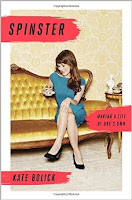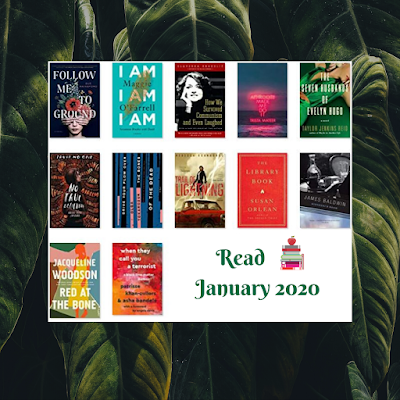This week I read Spinster: Making a Life of One's Own by Kate Bolick. A book about solitude, gender, writing, amazing women, and trying to find and live a life that makes you happy.
I think it was a good week to read this. Marriage Equality is free in the U.S. as of this week, the number of unmarried people in the U.S. right now hovers around 105 Million, and the national census states that for every 84 unmarried man in the country there are 100 women. Living alone, not being in a relationship, accounts for a vast part of the population. We are struggling as a culture to define ourselves, instead of just allowing everyone to be happy, and healthy, and live their own lives. Spinster focuses on the history of the word, the history of women, and the idea that you can by happy, no matter if that happiness is not what is the cultural norm.
Spinster focuses on is the many women who have helped shape Bolick's views. She is a writer, so she brings up a mob of women writers throughout the late 19th and through the 20th century who had to struggle to find their happy place. Each of these women have interesting, often tragic stories.
 |
| Meave Brennan |
One of the questions here is why is a single woman a Spinster, a word with a range of negative connotations, when a man gets to be a Bachelor, a word we see as fun and carefree? How do we take the word spinster and turn it to positive? Bolick argues that spinster should be a word that we "offer... up as shorthand for holding on to that in you which is independent and self-sufficient whether you're single or married." Most of the women the book focuses on were married at one point, many have children, one ended up a dreaded bag lady in New York City. None are better or worst off then the rest of everyone else who has gone about their lives, but these women really confronted their own ideas of the norm and fears.
 |
| Edith Wharton |
I loved this book because it talks about not trying to get a partner, not changing yourself, or "getting out there" - because the only way to be happy is to be coupled up. NO! This book is there to assure the rest of us, the ones who love living alone, who crave solitude in a crazy world, who have desires outside of making a perfect marriage, this book helps those people feel not so alone. A bit of irony? Maybe. But it also talks about Bolick's struggles with relationships, and she never tries to convince anyone that being in a coupledom, or seeking a loving relationship is wrong.

The one thing I wish for in this book is more happy stories of lone women. As the book progressed, and tragedy strikes each of the women that are held up as Bolicks "awakeners" (the shall we say role models, who encourage her through their life and writing to be who she wants to be), I found myself a bit frustrated. Isn't there happier stories out there? But the truth is that this is Bolicks story, almost a memoir of how she got to where she is, and it's okay that not everyone lives happily ever after in their choices. This is life for everyone no matter the path they choose.
Each woman in the book brings a fresh look at life, gender inequality, and happiness. She learns a lot from women who she researches in this life: "Charlotte [Perkins Gilman] showed me that we become adults by learning how to be responsible to ourselves, whether or not we're married or have children."
I am now excited to do more research on the women listed in the book, if nothing else Kate Bolick chose some fascinating women to introduce me to. It also makes me want to travel. To see Edith Wharton's house The Mount, visit the Ragged Island home of Edna Millay. To get out and live a world that is purely happily one's own.
Helpful links:


 The one thing I wish for in this book is more happy stories of lone women. As the book progressed, and tragedy strikes each of the women that are held up as Bolicks "awakeners" (the shall we say role models, who encourage her through their life and writing to be who she wants to be), I found myself a bit frustrated. Isn't there happier stories out there? But the truth is that this is Bolicks story, almost a memoir of how she got to where she is, and it's okay that not everyone lives happily ever after in their choices. This is life for everyone no matter the path they choose.
The one thing I wish for in this book is more happy stories of lone women. As the book progressed, and tragedy strikes each of the women that are held up as Bolicks "awakeners" (the shall we say role models, who encourage her through their life and writing to be who she wants to be), I found myself a bit frustrated. Isn't there happier stories out there? But the truth is that this is Bolicks story, almost a memoir of how she got to where she is, and it's okay that not everyone lives happily ever after in their choices. This is life for everyone no matter the path they choose. 


Comments
Post a Comment